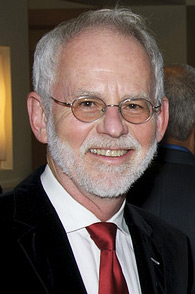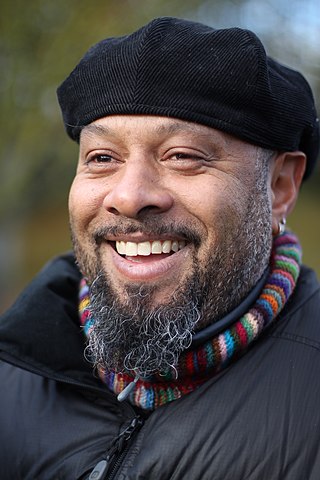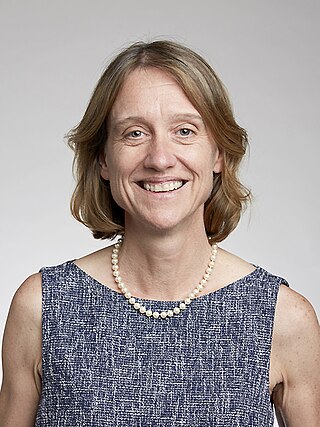
Gordon David Plotkin, is a theoretical computer scientist in the School of Informatics at the University of Edinburgh. Plotkin is probably best known for his introduction of structural operational semantics (SOS) and his work on denotational semantics. In particular, his notes on A Structural Approach to Operational Semantics were very influential. He has contributed to many other areas of computer science.

Roy D. Pea is David Jacks Professor of Learning Sciences and Education at the Stanford Graduate School of Education. He has extensively published works in the field of the Learning Sciences and on learning technology design and made significant contributions since 1981 to the understanding of how people learn with technology.

Dame Kay Elizabeth Davies is a British geneticist. She is Dr Lee's Professor of Anatomy at the University of Oxford and a Fellow of Hertford College, Oxford. She is director of the Medical Research Council (MRC) functional genetics unit, a governor of the Wellcome Trust, a director of the Oxford Centre for Gene Function, and a patron and Senior Member of Oxford University Scientific Society. Her research group has an international reputation for work on Duchenne muscular dystrophy (DMD). In the 1980s, she developed a test which allowed for the screening of foetuses whose mothers have a high risk of carrying DMD.

Christopher Michael Bishop is a British computer scientist. He is a Microsoft Technical Fellow and Director of Microsoft Research AI4Science. He is also Honorary Professor of Computer Science at the University of Edinburgh, and a Fellow of Darwin College, Cambridge. Chris was a founding member of the UK AI Council, and in 2019 he was appointed to the Prime Minister’s Council for Science and Technology.
Frances Rosemary Balkwill is an English scientist, Professor of Cancer Biology at Queen Mary University of London, and author of children's books about scientific topics.

Sir Harshad"Harry"Kumar Dharamshi Hansraj Bhadeshia is an Indian-British metallurgist and Emeritus Tata Steel Professor of Metallurgy at the University of Cambridge. In 2022 he joined Queen Mary University of London as Professor of Metallurgy.

Elizabeth Matilda Tansey is an Emerita Professor of the history of medicine and former neurochemist, best known for her role in the Wellcome Trust's witness seminars. She previously worked at Queen Mary University of London (QMUL).

Sarah Cleaveland is a veterinary surgeon and Professor of Comparative Epidemiology at the University of Glasgow.

Dame Celia Mary Hoyles, is a British mathematician, educationalist and Professor of Mathematics Education at University College London (UCL), in the Institute of Education (IoE).

Benjamin Bowling is Professor of Criminology & Criminal Justice at King's College London, an author and an honorary psychotherapist. He is a recipient of the Radzinowicz Memorial Prize awarded for the best article in the British Journal of Criminology in 1999. Bowling was elected Fellow of the British Academy in 2022.
Andrew Patrick Arthur Steptoe is a British psychologist and epidemiologist and Head of the Department of Behavioural Science and Health at University College London. He is a pioneer in health psychology and behavioural medicine in the UK and internationally, known for his work on psychosocial factors in cardiovascular disease, ageing, and positive wellbeing and health.

Julia Alison Noble is a British engineer. She has been Technikos Professor of Biomedical Engineering at the University of Oxford and a fellow of St Hilda's College since 2011, and Associate Head of the Mathematical, Physical and Life Sciences Division at the university. As of 2017, she is the chief technology officer of Intelligent Ultrasound Limited, an Oxford spin-off in medical imaging that she cofounded. She was director of the Oxford Institute of Biomedical Engineering (IBME) from 2012 to 2016. In 2023 she became the Foreign Secretary of The Royal Society.

Anne Jacqueline Ridley is professor of Cell Biology and Head of School for Cellular and Molecular Medicine at the University of Bristol. She was previously a professor at King's College London.
E-Theses Online Service (EThOS) is a bibliographic database and union catalogue of electronic theses provided by the British Library, the National Library of the United Kingdom. As of February 2022 EThOS provides access to over 500,000 doctoral theses awarded by over 140 UK higher education institutions, with around 3,000 new thesis records added every month.

Katherine Mary Blundell is a Professor of Astrophysics at the University of Oxford and a supernumerary research fellow at St John's College, Oxford. Previously, she held a Royal Society University Research Fellowship, and fellowships from the Royal Commission for the Exhibition of 1851 and Balliol College, Oxford.
Eileen M. A. Harkin-Jones is the Bombardier Aerospace-Royal Academy of Engineering professor of composites engineering at the Ulster University.
David Dennis Buckingham, is a media, communications and education scholar and retired academic.

Ann Blandford FHEA is Professor of Human-Computer Interaction (HCI) at University College London (UCL). She serves as deputy director of the UCL Institute of Healthcare Engineering. Her research focuses on behaviour change, well-being, and human errors in the field of healthcare.
Jonathan M. Austyn is Professor of Immunobiology at the University of Oxford and a Fellow of Wolfson College, Oxford. He has taught immunology over many years, and designed the Master of Science course in Integrated Immunology at the University of Oxford, which he co-directs.
Susan Sentance is a British computer scientist, educator and director of the Raspberry Pi Foundation Computing Education Research Centre at the University of Cambridge. Her research investigates a wide range of issues computer science education, teacher education and the professional development of those teaching computing. In 2020 Sentance was awarded a Suffrage Science award for her work on computing education.













